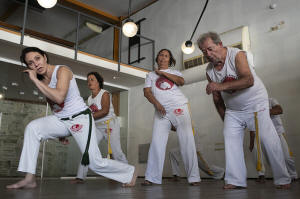Parkinson's patients in Brazil turn to a movement practice known as
capoeira to ease symptoms
[July 16, 2025]
By ELÉONORE HUGHES
RIO DE JANEIRO (AP) — Nilma Teles de Freitas, an 80-year-old retired
teacher in Brazil who was diagnosed with Parkinson’s disease more than a
decade ago, says she used to fall over all the time.
That changed after she began attending a capoeira class in downtown Rio
de Janeiro especially designed for people with the neurodegenerative
illness.
Capoeira is a movement practice that originated within the large
enslaved communities in Brazil, where nearly 5 million kidnapped
Africans disembarked during the transatlantic slave trade that started
in the 16th century.
It is considered both a martial art and a dance, combining ritual,
exercise, spirituality and music.
“Capoeira gives me freedom to work on my body. What I can do. What I
can’t do. So I can have balance and a more comfortable life,” Teles de
Freitas said during a recent class.
Practiced for centuries by Afro-Brazilians, it has since become popular
around the world. UNESCO recognized the practice in 2014 as Intangible
Cultural Heritage.
The project started in 2018 with physical therapist Rosimeire Peixoto,
60, who at that point had been attending capoeira classes herself for
over a decade.
After working with many patients with Parkinson’s, she said she became
convinced that introducing them to capoeira may help alleviate some of
their symptoms.

Parkinson's has a range of different symptoms, and along with
difficulties in balancing, some common ones include slowness of
movement, tremors and stooped posture. Patients can also experience
anxiety, depression, sleeping disorders and nausea.
“I had the idea after reading an article that said alternating both
hands when using a cell phone stimulates both hemispheres of the brain,”
she said. “And as a physiotherapist treating neurological patients, I
was lacking exercises that would motivate them.”
Peixoto's project was dubbed "Parkinson na ginga” — or “Parkinson's in
the swing” — a reference to the first fluid, rhythmic step that capoeira
practitioners learn. She now holds classes twice a week in the Progress
Foundry, a sprawling cultural center in downtown Rio next to a famed
white 18th century aqueduct and surrounded by palm trees.
[to top of second column]
|

Physical therapist Rosemeire Peixoto, left, founder of a project
called “Parkinson's in the swing,” leads a capoeira class for people
with Parkinson's disease at the Progress Foundry cultural center, in
Rio de Janeiro, Tuesday, July 15, 2025. (AP Photo/Bruna Prado)
 Capoeira helps improve balance,
coordination and strength, with music loosening up tense bodies,
Peixoto says.
“There is a lot happening in a capoeira circle. They feel the
vibration, the energy, they pay attention to the music and to the
partner to dodge blows” and to themselves, she said.
During a recent class, Peixoto walked among the students, placing a
gentle hand on a back here and there to help with balance, patiently
repeating demonstrations and offering words of encouragement.
Antônio de Azevedo, who was diagnosed with Parkinson’s disease a few
years ago, said he could hardly stand before. But since he started
practicing capoeira, his stability returned.
“It’s the best thing that’s ever happened to me,” he said while he
attended a capoeira class with around 10 other people, all with
Parkinson's.
Peixoto tries to make the classes a fun and social event — she often
suggests a group samba dance at the end of the class, and regularly
brings a cake to share.
Teles de Freitas, the retired teacher, says that she loves the
camaraderie among the class.
“We are there for one another,” she said. “Feeling and conversing
with friends gives strength.”
She remembers how when she got her diagnosis, she left the doctor’s
office crying, terrified of the future.
“Today I’m smiling," she said. "I’m managing to live. I’m managing
to interact with other people. I’m managing to be happy.”
All contents © copyright 2025 Associated Press. All rights reserved
 |